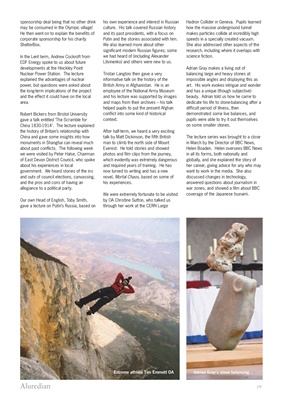
sponsorship deal being that no other drink
may be consumed in the Olympic village!
He then went on to explain the benefits of
corporate sponsorship for his charity
ShelterBox.
In the Lent term, Andrew Cockroft from
EDF Energy spoke to us about future
developments at the Hinckley Point
Nuclear Power Station. The lecture
explained the advantages of nuclear
power, but questions were asked about
the long-term implications of the project
and the effect it could have on the local
area.
Robert Bickers from Bristol University
gave a talk entitled 'The Scramble for
China 1830-1914'. The lecture explained
the history of Britain's relationship with
China and gave some insights into how
monuments in Shanghai can reveal much
about past conflicts. The following week
we were visited by Peter Halse, Chairman
of East Devon District Council, who spoke
about his experiences in local
government. We heard stories of the ins
and outs of council elections, canvassing,
and the pros and cons of having an
allegiance to a political party.
Our own Head of English, Toby Smith,
gave a lecture on Putin's Russia, based on
his own experience and interest in Russian
culture. His talk covered Russian history
and its past presidents, with a focus on
Putin and the stories associated with him.
We also learned more about other
significant modern Russian figures; some
we had heard of (including Alexander
Litvinenko) and others were new to us.
Tristan Langlois then gave a very
informative talk on the history of the
British Army in Afghanistan. He is an
employee of the National Army Museum
and his lecture was supported by images
and maps from their archives - his talk
helped pupils to put the present Afghan
conflict into some kind of historical
context.
After half-term, we heard a very exciting
talk by Matt Dickinson, the fifth British
man to climb the north side of Mount
Everest. He told stories and showed
photos and film clips from the journey,
which evidently was extremely dangerous
and required years of training. He has
now turned to writing and has a new
novel, Mortal Chaos, based on some of
his experiences.
We were extremely fortunate to be visited
by OA Christine Sutton, who talked us
through her work at the CERN Large
Hadron Collider in Geneva. Pupils learned
how the massive underground tunnel
makes particles collide at incredibly high
speeds in a specially created vacuum.
She also addressed other aspects of the
research, including where it overlaps with
science fiction.
Adrian Gray makes a living out of
balancing large and heavy stones at
impossible angles and displaying this as
art. His work evokes intrigue and wonder
and has a unique (though subjective)
beauty. Adrian told us how he came to
dedicate his life to stone-balancing after a
difficult period of illness, then
demonstrated some live balances, and
pupils were able to try it out themselves
on some smaller stones.
The lecture series was brought to a close
in March by the Director of BBC News,
Helen Boaden. Helen oversees BBC News
in all its forms, both nationally and
globally, and she explained the story of
her career, giving advice for any who may
want to work in the media. She also
discussed changes in technology,
answered questions about journalism in
war zones, and showed a film about BBC
coverage of the Japanese tsunami.
Adrian Gray's stone balancing
Extreme athlete Tim Emmett OA
Aluredian 19